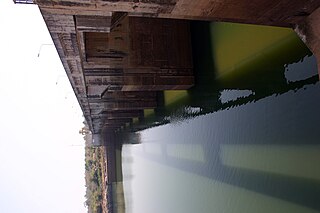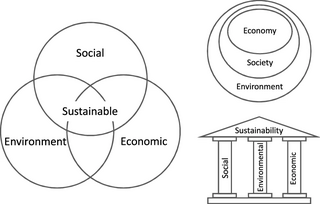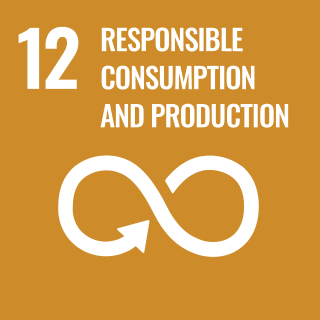Related Research Articles
Sustainable development is an approach to growth and human development that aims to meet the needs of the present without compromising the ability of future generations to meet their own needs. The aim is to have a society where living conditions and resources meet human needs without undermining planetary integrity. Sustainable development aims to balance the needs of the economy, environment, and social well-being. The Brundtland Report in 1987 helped to make the concept of sustainable development better known.
Environmental finance is a field within finance that employs market-based environmental policy instruments to improve the ecological impact of investment strategies. The primary objective of environmental finance is to regress the negative impacts of climate change through pricing and trading schemes. The field of environmental finance was established in response to the poor management of economic crises by government bodies globally. Environmental finance aims to reallocate a businesses resources to improve the sustainability of investments whilst also retaining profit margins.

The Pak Mun Dam is a barrage dam and run-of-the-river hydroelectric plant 5.5 km west of the confluence of the Mun and Mekong Rivers in Khong Chiam District, Ubon Ratchathani Province, Thailand. It was constructed by the Electricity Generating Authority of Thailand (EGAT) with support from the World Bank at a total cost of US$240 million, and completed in 1994.
A green economy is an economy that aims at reducing environmental risks and ecological scarcities, and that aims for sustainable development without degrading the environment. It is closely related with ecological economics, but has a more politically applied focus. The 2011 UNEP Green Economy Report argues "that to be green, an economy must not only be efficient, but also fair. Fairness implies recognizing global and country level equity dimensions, particularly in assuring a Just Transition to an economy that is low-carbon, resource efficient, and socially inclusive."

Environmental resource management or environmental management is the management of the interaction and impact of human societies on the environment. It is not, as the phrase might suggest, the management of the environment itself. Environmental resources management aims to ensure that ecosystem services are protected and maintained for future human generations, and also maintain ecosystem integrity through considering ethical, economic, and scientific (ecological) variables. Environmental resource management tries to identify factors between meeting needs and protecting resources. It is thus linked to environmental protection, resource management, sustainability, integrated landscape management, natural resource management, fisheries management, forest management, wildlife management, environmental management systems, and others.
Global change in broad sense refers to planetary-scale changes in the Earth system. It is most commonly used to encompass the variety of changes connected to the rapid increase in human activities which started around mid-20th century, i.e., the Great Acceleration. While the concept stems from research on the climate change, it is used to adopt a more holistic view of the observed changes. Global change refers to the changes of the Earth system, treated in its entirety with interacting physicochemical and biological components as well as the impact human societies have on the components and vice versa. Therefore, the changes are studied through means of Earth system science.
Global governance refers to institutions that coordinate the behavior of transnational actors, facilitate cooperation, resolve disputes, and alleviate collective action problems. Global governance broadly entails making, monitoring, and enforcing rules. Within global governance, a variety of types of actors – not just states – exercise power.

The Global Reporting Initiative is an international independent standards organization that helps businesses, governments, and other organizations understand and communicate their impacts on issues such as climate change, human rights, and corruption.

The Greater Mekong Subregion, (GMS) or just Greater Mekong, is a trans-national region of the Mekong River basin in Southeast Asia. The region is home to more than 300 million people. It came into being with the launch of a development program in 1992 by the Asian Development Bank that brought together the six Asian countries of Cambodia, China, Laos, Myanmar (Burma), Thailand, and Vietnam.
International Rivers is a nonprofit, nongovernmental, environmental, and human rights organization. Founded in 1985 by social and environmental activists, International Rivers works with policy and financial analysts, scientists, journalists, development specialists, and volunteers to combat the adverse effects of dams and their legacies that it has identified in over 60 countries.

Sustainability is a social goal for people to co-exist on Earth over a long period of time. Definitions of this term are disputed and have varied with literature, context, and time. Sustainability usually has three dimensions : environmental, economic, and social. Many definitions emphasize the environmental dimension. This can include addressing key environmental problems, including climate change and biodiversity loss. The idea of sustainability can guide decisions at the global, national, organizational, and individual levels. A related concept is that of sustainable development, and the terms are often used to mean the same thing. UNESCO distinguishes the two like this: "Sustainability is often thought of as a long-term goal, while sustainable development refers to the many processes and pathways to achieve it."
The Kandadji Dam, is a large multipurpose dam under construction on the Niger River. The site is situated near the small town of Kandadji, Tillabéri Department, Tillabéri Region, Niger, 180 km northwest of the capital Niamey. It is being built by the Haut Commissariat à l'Aménagement de la Vallée du Niger, a public body under the Primer Minister's Office.

Green growth is a concept in economic theory and policymaking used to describe paths of economic growth that are environmentally sustainable. It is based on the understanding that as long as economic growth remains a predominant goal, a decoupling of economic growth from resource use and adverse environmental impacts is required. As such, green growth is closely related to the concepts of green economy and low-carbon or sustainable development. A main driver for green growth is the transition towards sustainable energy systems. Advocates of green growth policies argue that well-implemented green policies can create opportunities for employment in sectors such as renewable energy, green agriculture, or sustainable forestry.
Environmental governance (EG) consists of a system of laws, norms, rules, policies and practices that dictate how the board members of an environment related regulatory body should manage and oversee the affairs of any environment related regulatory body which is responsible for ensuring sustainability (sustainable development) and manage all human activities—political, social and economic. Environmental governance includes government, business and civil society, and emphasizes whole system management. To capture this diverse range of elements, environmental governance often employs alternative systems of governance, for example watershed-based management.

The United Nations Environment Programme Finance Initiative is a partnership between the United Nations Environment Program (UNEP) and the global financial sector to catalyse action across the financial system to align economies with sustainable development. As the UN partner for the finance sector, they convene financial institutions on a voluntary basis to work together with them, and each other, to find practical solutions to overcome the many sustainability challenges facing the world today. UNEP FI does this by providing practical guidance and tools which support institutions in the finance sector to find ways to reshape their businesses and commit to targets for limiting greenhouse gas emissions, protecting nature, promoting a circular economy and supporting financial inclusion to address inequality. The solutions developed effectively form a blueprint for others in the finance sector to tackle similar challenges and evolve their businesses along a sustainable pathway. The creation and adoption of such a blueprint also informs policy makers concerned with sustainability issues about what would constitute appropriate regulation for the finance sector at large. Founded in 1992, UNEP FI was the first organisation to pioneer engagement with the finance sector around sustainability. The Finance Initiative was responsible for incubating the Principles for Responsible Investment and for the development and implementation of UNEP FI's Principles for Responsible Banking and Principles for Sustainable Insurance as well as the UN-convened net-zero alliances. Today, UNEP FI provides sustainability leadership to more than 400 financial institutions, with assets of well over $80 trillion headquartered around the world.

Pavan Sukhdev is an Indian environmental economist whose field of studies include green economy and international finance. He was the Special Adviser and Head of UNEP's Green Economy Initiative, a major UN project suite to demonstrate that greening of economies is not a burden on growth but rather a new engine for growing wealth, increasing decent employment, and reducing persistent poverty. Pavan was also the Study Leader for the ground breaking TEEB study commissioned by G8+5 and hosted by UNEP. Under his leadership, TEEB sized the global problem of biodiversity loss and ecosystem degradation in economic and human welfare terms, and proposed solutions targeted at policy-makers, administrators, businesses and citizens. TEEB presented its widely acclaimed Final Report suite at the UN meeting by Convention on Biological Diversity (CBD) in Nagoya, Japan.
Multistakeholder governance is a practice of governance that employs bringing multiple stakeholders together to participate in dialogue, decision making, and implementation of responses to jointly perceived problems. The principle behind such a structure is that if enough input is provided by multiple types of actors involved in a question, the eventual consensual decision gains more legitimacy, and can be more effectively implemented than a traditional state-based response. While the evolution of multistakeholder governance is occurring principally at the international level, public-private partnerships (PPPs) are domestic analogues.

The Sustainable Development Goals (SDGs) are a collection of 17 global objectives established by the United Nations in 2015 as part of the 2030 Agenda for Sustainable Development. These goals aim to address a broad range of interconnected global challenges, including poverty eradication, environmental sustainability, social equity, and economic growth, under the guiding principle of "leaving no one behind." Designed to replace the Millennium Development Goals, the SDGs apply universally to all countries, irrespective of their development status, and seek to promote peace, prosperity, and the health of the planet.

Sustainable Development Goal 13 is to limit and adapt to climate change. It is one of 17 Sustainable Development Goals established by the United Nations General Assembly in 2015. The official mission statement of this goal is to "Take urgent action to combat climate change and its impacts". SDG 13 and SDG 7 on clean energy are closely related and complementary.

Sustainable Development Goal 12, titled "responsible consumption and production", is one of the 17 Sustainable Development Goals established by the United Nations in 2015. The official wording of SDG 12 is "Ensure sustainable consumption and production patterns". SDG 12 is meant to ensure good use of resources, improve energy efficiency and sustainable infrastructure, provide access to basic services, create green and decent jobs, and ensure a better quality of life for all. SDG 12 has 11 targets to be achieved by at least 2030, and progress towards the targets is measured using 13 indicators.
References
- ↑ Schulz, Christopher; Adams, William M. (2023). "The Politics of Environmental Consensus: The Case of the World Commission on Dams". Global Environmental Politics. 23 (2): 11–30. doi:10.1162/glep_a_00687. hdl: 10023/26631 . ISSN 1526-3800. S2CID 254721337.
- ↑ International Rivers, The World Commission on Dams Framework - a Brief Introduction, February 29, 2008. Archived April 1, 2020, at the Wayback Machine